My birthday was last week and I had only one thing on my mind. Can you guess what it was? Nope, it wasn’t thoughts about getting older, or what presents I wanted this year or where I wanted to go on my next vacation. All I could think about was “Where am I going to get my birthday cake from!?!”
This is a dilemma for my family and me every single time there is a birthday on the horizon. We sometimes have knock down, drag out fights about where we buy our cakes…and that’s because not everyone in my family follows the same real food principles as I do. (I’m secretly hoping they will read this post so they’ll think twice about fighting me next time around!)
Growing up we would always get our cake from the local grocery store chain “Harris Teeter.” This was our go-to cake for as long as I can remember. Then in college and in my early twenties I became a Costco member and was thrilled to be able to get such a huge decadent cake for only $14.99 on my college budget. As I became more refined in my taste for cake, I thought it would be a good idea to upgrade and shop at the Fresh Market because… well… it had to be “fresher” than Harris Teeter or Costco, right? Unfortunately, as you’ll find out this couldn’t be further from the truth.

When you look into these three different cakes from three very different places – a regular grocery store vs. a huge wholesaler warehouse store vs. a specialty market – you don’t see much difference in the ingredients. They all resemble one big science experiment…
Let’s take a look at some of the cakes at Harris Teeter. This cake says “Home-style” carrot cake… but when you you look closely at the ingredients it reveals something much different…
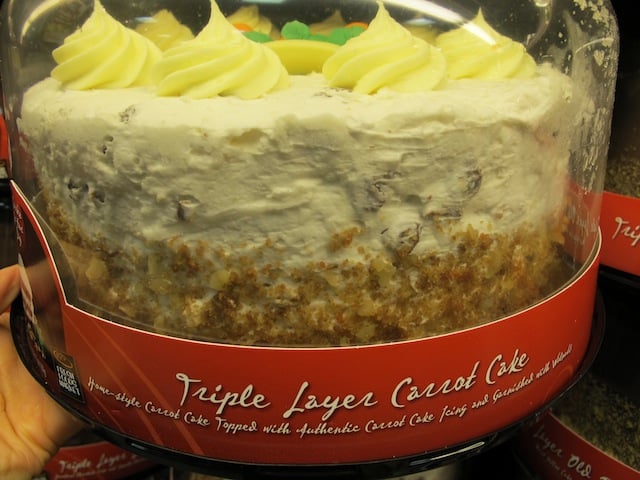
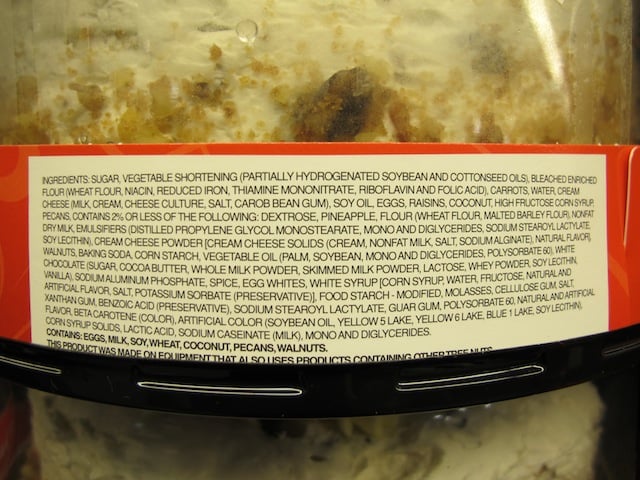
We know why Lisa dislikes artificial colors (that are unfortunately in all the cakes I am sharing with you here today.) But let’s talk about a new and scary ingredient you may not have heard of – propylene glycol. This petroleum based chemical food additive – that’s been approved by the FDA – is also found in products like brake fluid, acrylic paints, tile grout, primer, shoe polish, antifreeze, floor polish, tire sealant and sealant paste, according to Food Facts.org. It has been reported on Dr. Mercola.com that the following symptoms can arise after repeated small doses – throat irritation, headache, backache, and kidney problems. Furthermore, ingesting very large doses of this chemical can cause drowsiness, vomiting, respiratory failure, coma, convulsions, or can be fatal.
Yes – you have to ingest a lot of this stuff to see some of these reactions – but is saying “death by a thousand cuts?” taking it too far? I don’t know – you decide. And why is this stuff in our birthday cakes anyway?
Even the cakes that Harris Teeter gets from a famous local bakery, “Tizzerts,” are just as bad as their store brand cakes because they also contain propylene glycol.
Then you move on to Costco where the ingredient list is so long I literally had trouble keeping count – but it’s close to 80 ingredients! The majority of them are fake chemical fillers and food-like substances that are obviously not real food. (Notice the inflation – the price has gone up $3 dollars since the last time I bought one.)
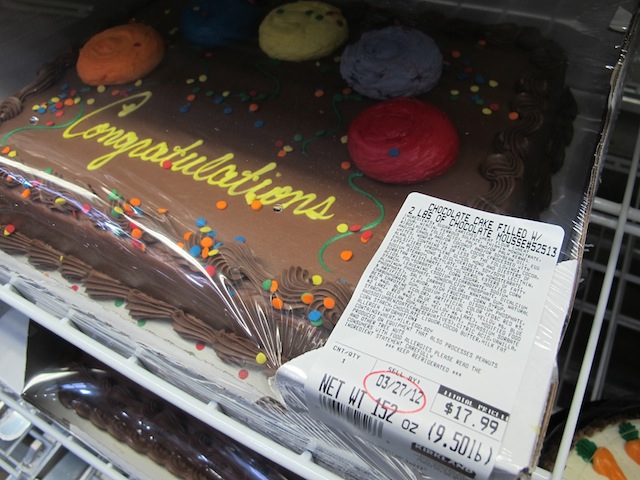
And what’s so American about this “All American” chocolate cake? Gosh I didn’t know you needed this many artificial colors (6 to be exact!) to color chocolate – I thought chocolate was already brown!
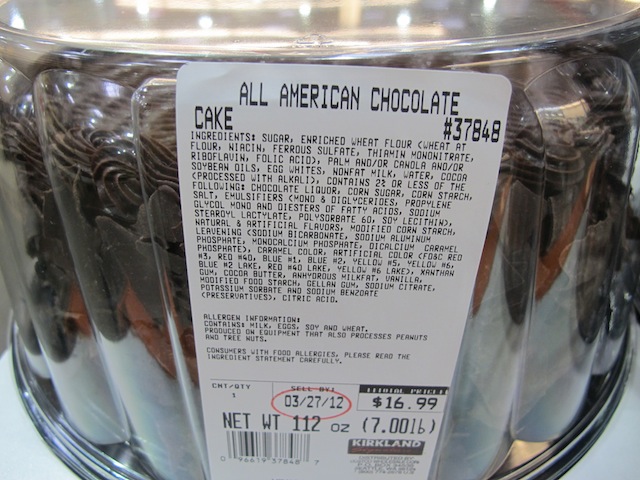
The most upsetting – and most expensive – cakes were from The Fresh Market where I learned they aren’t made on premises, but instead by a bread and snack manufacturer named “Vie de France.” Again, this name fools you into thinking you are getting a higher quality or fancier product. I was impressed that The Fresh Market had a book of all the ingredients they willingly shared with me, but when I found the page labeled “bakery goods free from trans fat” (which had only a very small subset of the large amount of bakery goods in the book) I was deflated to say the least. Again, most of their cakes had propylene glycol too and lots of other preservatives.
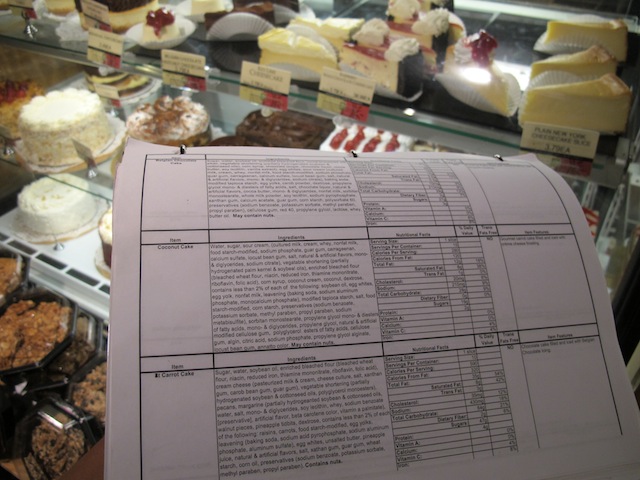
Regardless of these ingredients being clearly labeled on packaging and readily available, I see these types of cakes at almost every celebration I encounter – baby showers, bridal showers, children’s birthday parties, schools, work celebrations, retirement parties, etc. Children’s birthdays are probably the worst offender… especially at school, since the opportunities to celebrate birthdays seem endless.
The thought of consuming artificial flavors, artificial colors, transfat, and other food like chemicals made from petroleum willingly on the day we are supposed to be celebrating our life or our children’s lives seems a little ironic, doesn’t it?
The next time the occasion arises and it’s time to get a cake, here are 5 questions you need to ask your baker before reaching into your wallet:
- What ingredients do you use to make your cakes? Always ask this basic question – you may be appalled at what you find. For instance, many cake manufactures use no real sugar at all and the whole cake is made with high fructose corn syrup.
- What kind of flour do you use? The answer should be an unbleached flour, and if it is organic flour, even better!
- Do you use any preservatives in your cake? Propolyne glycol, parabens, and polysorbate are just a few of the laundry list of potential preservatives. If there are any of these ingredients or other preservatives used – I would keep looking.
- Do your cakes contain any partially hydrogenated oils (trans fat)? I would specifically say “partially hydrogenated oil” because legally food manufactures can still include this ingredient and say “no trans fats” at the same time.
- Do you use any artificial colors in your cakes? If you find out the cake is clean, but they still use artificial colors to decorate the cakes, ask for the cake to be made without them and then consider decorating the cake with organic candies, dried fruit, chocolate sauce and/or natural food colorings yourself.
You make a decision to vote with your dollars every time you take out your wallet, whether you realize it or not. With the right information and enough conscious decision making about what we eat and how we spend our money, together we can make a change. They say you can’t have your cake and eat it too – but why not?
P.S. Check out a new REAL FOOD cake recipe I made for my Dad’s Birthday this week on my blog… (oh and I’m sorry it’s not going to be this gorgeous… this is a cake I had last year traveling in Indonesia!)
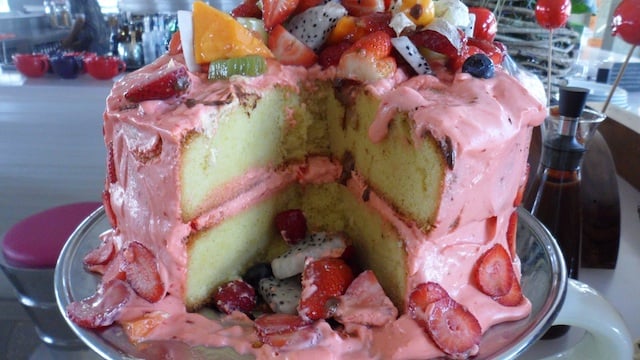



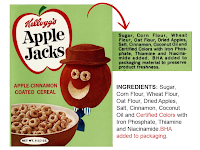




Thank you so much for bringing this to light! My birthday is coming up also and I make all of our other cakes, I did NOT want to have to make my own. However, what I do not want more, is to have anything from a store. Ice cream cake is also out! All I want is cake, balloons and a card…those are the req’s for me. Thanks again food babe! I can now show this to my hubby and prove to him I’m not just nagging him about eating healthy!
Great post! You’re right. Usually the “laundry list” of ingredients in these cakes are nearly as wide as my hand.
I have a question for you, Food Babe. I read in this post how not all of your family follows the same whole, healthy, unprocessed food practices that you do — my husband and I are also the few among our friends and family. I want to know how you manage to visit parents, in-laws, friends, and other get-togethers where there are non-organic, processed, meat-centric meals. I try to be careful with how I speak about my food preferences, so as not to seem proud. It has become tradition to go over to our parents’ house every Sunday (lunch with his, dinner with mine) and although they are aware of our food convictions, they will serve things that put me in an awkward position. How do you go about handling such situations, where there are no healthy options, while keeping everyone’s feelings intact and not seeming snobby?
For me, I am a realist and realize that we will not avoid all of the bad stuff, but if we avoid 80%-90%, we will be far better off. So, in this case, I would probably not say anything, so long as it wasn’t something I was allergic to or something like that.
I would highly recommend that you ALWAYS contribute the both Sunday meals. Not only will you be a gracious guest, but you will also have something at the meal that is better suited for your food preferences. Eating a small portion of “their” food and then rounding out your meal with your dish will make everyone happy.
Perfect
“I also believe that Apple will need to open up more services to the developers, such as Siri, to generate additional innovation.”
Let me begin by saying I think it’s very great that you have tied this particular issue to the larger and more endemic problem chemically manufactured foods in our society today.
However, I think your post is a little misleading a number of points. The side effects you mentioned -“throat irritation, headache, backache, and kidney problems”- are those experienced by individuals who have allergies to this substance -while its fair to point out but thats akin to lambasting a cake that has nuts in it -and far more americans are allergic to nuts than propylene glycol. The other point is a little bit of scare mongering and misreferencing on your part -“ingesting very large doses of this chemical can cause drowsiness, vomiting, respiratory failure, coma, convulsions, or can be FATAL.” -the last word has a hyperlink to a study that purportedly supports this claim -but the very name of that article is ‘intravenous’ -not ingest -and the levels that it would require to hit that fatal dose through actual consumption via food additives would be near impossible.
I don’t think it serves the purpose of your cause to scare monger and mislead. A cursory examination of scholarly articles on the topic using Google Scholar suggest that the vast majority of studies support that this additive in small doses even administered over lengthy periods of time does not lead causally to fatalities or long term illnesses. That being said -none of these studies have been undertaken on a long enough time scale that would permit its correlation with cancer and other late life illnesses -and thats where the problem is!! we should be talking about how good scientific work is being bastardized by policy makers and lobbyist -and any of the researchers in those studies will be the first to say we don’t know what the association is. Perhaps theres none -but why risk it and find out when its too late?
Much appreciated comment. While I do agree that we do not need to be eating food with lists of ingredients that we can’t pronounce, I get SO weary of these “sky is falling” bloggers who take scientific studies and cherry pick things from them and use them to sell their own agenda.
Should we be eating this? Probably not and the truth is, we need to have more longitudinal studies that determine if we are seeing long term damage at a cellular level from the food additives that we’re ingesting. It is in our best interest to lean towards eating as clean as possible and as close to the earth as we can. HOWEVER, these scare tactics do nothing more than make people feel overwhelmed and helpless, and when they DO find out the facts; that only some people have sensitivities that that particular additive, that this item may be used in a non-food item in addition to a food item that makes it poison even though that may be far from the truth…eventually they aren’t going to know what to believe.
If you have valid points to make, make them using the truth.
Valid points, Brian. It’s also used in asthma inhalers, is quite safe. The manufacturers *have* to report any symptoms that but they aren’t required to label the studies. If just one in a million has a dry itchy throat, they have to list it.
@ Brian,
You need to do some fact checking yourself, how much longitudinal studies you want, fact: Asthma in Kids is rising, childhood diabetes is on the rise, chemical imbalance due to these chemicals/poisons being slowly ingested on daily basis is the root cause of this evil. Face the fact instead of criticizing get involved and make a change.
I think you and MNK are confused about what a fact is.
Brian came in to point out, “Why yes, this IS a situation we should be addressing and researching. However, let’s approach it honestly, and not from a ‘The sky is falling!!’ perspective.”
I’d rather go where the facts lead me, not twist the facts to take me to where I want to go.
Brian, good points – however, has a study been done on the rising cases of illnesses in general, and the cause of them? Obesity, cancer, diabetes, etc. – and the fact it is NOT a worldwide problem but a problem nonetheless especially in those countries that ‘manufacture’ items for food but not using food itself?
Yes, some words in this article might be extreme, but if extreme is what it NOW takes to ensure what goes in our mouths is as healthy as a plant growing in pure soil and chemical-less water, why not? Your response sounds exactly the opposite – undermining the ingredients in order to ‘make it seem ok’.
Well, it isn’t. And THAT, is a fact.
Oh and one more thing – I always bake, I own a bakery – and never do I use ingredients that weren’t as fresh as our brains in the morning. No artificial sweeteners for my lemonades, cakes or cookies, no preservatives other than salt (not even citric acid), pure sugar, fresh teas, fresh coffee – and the list goes on.
Life’s good – make it better 🙂
I would love for food babe to check out The cakes at Whole Foods. I’ve shop there since they opened and more and more questionable ingredients are finding their way into their baked goods. I’ve spoken to people at WF who assure me their corporate nutritionist has verified that all ingredients are perfectly safe and pass the WF “smell test”. I’m not convinced and think YOU, Vani, could get them to explain the change from 5 ingredient labels to 15 ingredient labels!
Whatever the case, I’m not at all comfortable knowing I’m giving my family food containing petroleum products as part of the ingredients, no matter how minuscule the amount !
What ever happened to people that bake?? I always make my friends’ birthday cakes, so I know exactly what goes into them. Sure, it takes some time, but-isn’t that the point of making something ourselves?? People have become too reliant on quick, fast, and easy!
I bake and I love baking for others!
Funny thing is that a boxed cake really doesn’t save you any more time than making it from scratch and scratch is so much more tasty!
Exactly. Been a baker most my life, and enjoy it! Just means something more….
It’s about time the chemical feast known as store-bought cakes was brought to light…..I would never touch the garbage and it never tasted like food to me!
I do not buy supermarket cakes, I never have. Seeing this travesty of actual food makes me realize I did the right thing. That “All American” cake is called All American because only in America can food companies legally push such poison at us like it’s safe for consumption.
I don’t understand how people can eat supermarket cake. It tastes like crap compared to homemade cake.
No wonder the average life expectancy has declined in America. Because of American apathy and ignorance, people are getting poisoned. Americans have about the most toxic diet anywhere in the world. 80% of American prepackaged food is so toxic it is banned in other countries.
@food_babe. Please take notice of Brian’s comment below. Propylene Glycol is not a death threat, and you are loosing face with promoting such propaganda.
@ Era, how can she be ” loosing face with promoting such propaganda” looks to me you work for the food stores, or you like to feed chemicals to yourself and to your near and dear ones. Read the facts it is just not food_babe, it is all over the web, get educated first before you start mud slinging, looks like you have been feeding on these chemicals for way too long. Your post proves my point.
Proves your point??? Hmmmm
looks to me you are actually Food Babe afraid to put your money where your mouth is…oh and here’s a little mud, consider it thrown in your face. I won’t be coming back to this blog now, Food Babe (or yeskay, whatever your true identity is) so I won’t be reading your high pitch squeaking response. Proves my point. (yes that was just as out of context as yours).
I’m a Home-Baker and a holder of HACCP cert. Concern for the consumers and not just for the profits. I bake for a Cause. Cake for a Cause.
Dear Food Babe,
I was just wondering and I honestly do not mean to sound snarky or mean, but do you have a background in nutrition, food production industry, food engineering/ chemistry, etc?
I was looking over your site bio and did not see any indication.
If so I then, have a hard time understanding why it took you so long to realize that a big box store and even specialty supermarket, both of which seem to clearly label their lengthy list of ingredients on their food label could potentially and obviously contain artificial ingredients and could also be unhealthy.
I noticed you do mention that they are clearly labeled within your article, and I do understand your concerns about consuming these artificial ingredients as well as the need to understand where our food comes from, but honestly it just seems odd it took you such a long time to realize this?
Dear T.McGee
Are you a psychologist (I’ll be numb struck if you are)? If yes, when should she have recognised what she wrote? Is there a timeline she should have followed according to psychology?
As a chef and baker myself, I too realized this much later. I mean why would anyone put so many ingredients – it’s not a thought process when you’re looking at lovely cakes. There are moments when one realizes it later. Don;t hold someone to it – and she doesn’t need to be a chemist to understand.
We are human.
Anti freeze is made of ethylene glycol not propylene glycol. While I agree with much of what you say, if you are going to use science/chemistry then get it right.
Gabrielle, you are incorrect.
Propylene Glycol IS also an antifreeze. I’m a mechanical engineer, and I buy drums of it to use in our chiller systems.
Before correcting someone, why don’t *you* get it right?
At the end of the day we all know shop bought cakes and processed foods contain chemicals, preservatives and other nasties. To avoid these as much as possible the only thing you can do is prepare all of your own food from scratch in your own kitchen. Common sense should be used – there is a place in modern life for processed food but it should be very occasionally and not every day – a little bit if what you fancy won’t hurt you xx
Any cake you buy in a store is going to be baked in a factory, and covered/filled with frosting that is designed to sit on a shelf for months at a time, without needing any refrigeration. They color and flavor the frostings with chemicals to ensure consistency. Don’t however assume that you can avoid this by buying from your local bakery or licensed home baker. An alarming number of smaller bakers are now using these chemicals to save time and money, often thinking that because they mixed the product themselves it still counts as scratch. It is completely normal now to find box mixes, commercial frosting and artificial flavor emulsions in locally produced bakery products. Don’t think you don’t still need to ask.
Jen I think you bring up a great point that just about any cake you buy in a store is going to have a long list of things that most can’t even pronounce, and though there are a lot of local bakers that do cut corners by using additives in their cakes or using a mix to save time and money, not all do. There are those bakers out there that take pride in what they create baking fresh and homemade with good substantial ingredients. So if you’re not a baker or don’t know a baker ask, ask people what they put in their cakes and baked goods. A proud baker will tell you. I own a bakery and I have made it my mission to make sure that we use the freshest ingredients and as many local ingredients as possible and though I wouldn’t give away our recipes I would be happy to tell anyone who asks me what ingredients we’ve used in our bakery to create our sweet treats.
Wow, even though I am not in the US, I am a cake baker and could not believe in how many stuff you guys there can put in a cake. Thank god I only use fresh products, no additives and natural made colouring. Made me feel so much better to know that my choices for my costumers are far better
Make your own damn birthday cakes instead of buying them! It is not hard to follow directions. Home made cakes will taste much better than the commercial cake with all the chemicals and artificial ingredients.
The sad thing is that those of us who do make natural, healthy ingredient cakes have to do so illegally. My state, for example just created home baking business laws. You are literally allowed to use all kinds of additives, but you’re not allowed to use butter, cream, coconut oil, fresh fruit at all. For icing, you’re pretty much limited to using shortening, sugar and chocolate. If you conform to these rules (I.e. use NO perishable ingredients), you can then sell your goods at places like farmers markets. They are concerned that perishable won’t be properly refrigerated. It seems there’s no concern for people ingesting chemicals. It’s very frustrating. I don’t think most people realize that it’s government regulations which make it impossible to sell a healthier birthday cake.
After many years of terrible rashes that covered my entire body, I had specialized testing done. The rashes were due to a severe reaction to propylene glycol. It is in ALL cake mixes in typical grocery stores, muffin mixes, lowfat ranch dressings, biscuits and cinnamon rolls that you break open and bake. It is also in many gelcaps prescribed by your doctor. It is an expensive additive. It is found less often in generic products. I also have to read hair care and body wash labels because it is prevalent in these products. Stay away if you can. A biproduct of propane should NOT be in our foods.
I am also allergic to PG and it is in EVERYTHING! So frustrating when trying to find shampoo, conditioner, makeup, deodorant, food, and on and on!
Just to clarify, you can use perishable ingredients in baked goods…you cannot use them in things like icings, fillings, semi-cooked meringue buttercreams, etc. and you can’t use fresh fruit in the filling or on top as it would make the cake “perishable”. There’s got to be a way to ensure the public’s safety, but also not force us to make nasty vegetable shortening and sugar “fake buttercream” icing and then add butter “flavoring” .
KinderDawne, I’m so sorry you have to live with that. It must be so frustrating.
Gotta weigh in here because I’m annoyed.
Antifreeze also contains water. Just because an ingredient is in something other than food doesn’t mean it will kill you. Propylene glycol is used in many things, including medications. For example, do you ask your doctor for a chemical breakdown and list of what’s in your birth control pill as well as where it came from and what other products those ingredients are in? The pill is far more lethal than propylene glycol, yet millions of women take it, and live long, happy lives with just the right amount of kids .
I find your scare tactics to be appalling. Cake is not meant to be consumed in massive quantities. That is really the root cause of many illnesses…eating too much in general. My grandfather lived to 94, I’m pretty sure he consumed foods with arsenic during his lifetime.
I leave you with this thought: From an economic standpoint, if supermarkets can’t keep food on the shelf long enough for it to be purchased, no one would be able to afford groceries. All you have to do is look at the prices at Whole Foods and then go to a grocery store.
This is a great article. I haven’t bought cake in a grocery store or Costco in forever because of all the chemical ingredients. Actually, I don’t buy any ready-made food at Costco (and some other places) because of the long ingredient lists containing colourings, sodium benzoate, potassium sorbate, BHT and all manner of other components that I’d rather avoid.
I love your website. I am considered a bit of a food snob but really, I just like to eat real food. I have always hated supermarket cakes and never purchase them. I only get my baked goods from Whole Foods. Hopefully your site and in particular this article, will help people realize that saving money on their cake will cost them more in medical expenses. The non chemical food made with natural ingredients, always tastes better!
First of all I’ll be honest. I have not read all the comments here so this is a personal opinion. If this is a warning about ALL purchased birthday cakes the IMO it is silly. Some companies make a good cake. However. Make one yourself. I first made a birthday cake, a fruit cake when I was about 16. No problem. So if your against purchasing then set to and make one. Takes time? Yes. Takes care? Yes. Tastes great? Yes. 🙂
I have read a few of these posts and have noticed a few science issues, facts that are not really correct, or used in the wrong way. I really suggest taking some high level biochem classes, and organic chem to understand ingrediant lists a bit better. When you influence people though blogs like this is important to provide correct information. A lot of the ingrediants you tell people to avoide, are common in all foods, or produce, often not added. No one gives you an ingrediant list of whats in your steak? I really encourage you to better your understanding in science so that you have a positive influence on society, and their intellegence.
Great to know
We often buy cakes at our local Whole Foods Market and they are both delicious and made only from real ingredients. And certainly this is true for many independent bakeries as well. So while you should certainly be a good consumer, and ask questions, there are plenty of places you can buy a quality cake made with quality ingredients.
There is alway more to a story.
http://www.naturalnews.com/023138_propylene_glycol_products_natural.html#
It scares me when people actually make an arguement for using High Fructose Corn Syrup, Propylene Glycol, Azodiacarbonamide and other toxic chemicals in the food we eat. Perhaps they are not too damaging in very small doses, but we are bombarded with these ingredients in everything we eat and everything we use on our bodies, like some shampoos, soaps and lotions. These chemicals are collectively building up in our bodies. There is absolutely no reason why we can’t use real food! I lived in Germany, where they don’t use use GMO’s, Azodiacarbonamide or the laundry list of other chemicals that our FDA approve. The food tastes wonderful! The point is-We don’t need it, so let’s tell these companys to stop using it. I don’t want to risk my children’s health just because they are approved chemicals.
Simple & uncomplicated..
Eat plants(organic when possible), not made in ‘plants'(big industry).
Let your wallets do the talking! 🙂
All plants are organic. YOU are organic. Living organisms are organic.
HI Food Babe,
I totally support all your efforts!! It is so hard to convince friends and family that GMOs are behind all the diseases that are now common in kids and adults. Is there some way you can find out what ingredients were in the candies and breakfast cereals in the 80′s before GMOs were put in our foods? I feel like our butterfingers bars in the 80′s had actual sugar in it and not all these GMO ingredients.
IT WOULD BE A FABULOUS ARTICLE IF YOUR TEAM COULD RESEARCH AND COMPARE CANDY,BREAKFAST CEREAL AND SNACK INGREDIENTS PRE GMO AND AFTER.
THANK YOU!!
Here’s an idea, bake you’re own. They you can choose the ingredients yourself.
People…relax! A Birthday Cake is just meant to be a beautiful token on someone’s “special day”….makes the recipient feel good…etc. Just eat a little slice and enjoy the occasion!
It won’t kill you!
All your “stress” & “worry” over every single ingredient propably is shortening your life more than tasting a tiny slice of
store bought birthday cake will!!!
Eat healthy the other 99 per cent of the time….and you wilk do just fine.
Thank you Vani for the great article! I shop at Acme and see the cakes for birthdays and even slices of cake, cookies, etc. They all have those yucky ingredients labels on the plastic packaging they are in. Why it take some many chemicals to make a cake? And store baked ,I guess does not mean fresh and natural. The chemical thing is preserving and a cheaper way to make for the mass market and prolong the shelf life. The USA have been lacking a lot in out food of every kind. Being too cheap in not using “real” natural ingredients! I am a label reader! A lot of people don’t read food labels and some will ignore and continue to eat stuff made like that. It is up to the individual to make a change from it. That is why I have been going back to and doing my own home made banana bread, rolls, strawberry jams and fruit juice. If you make time you will be healthier and to know and say, I know where it came from and with natural simple ingredients, my own kitchen!
Did you see this? I now know why those little stickers are on fruit and vegetables! Hard true facts! A PLU Sticker Has A Purpose:
The produce that you buy in the supermarket is labeled with a PLU (Price Look Up) sticker. These serve more purpose than being overly annoying to get off of the fruit. How many times have you tried to pull one off of a plum and a chunk of the flesh comes off? So annoying. But…the PLU’s are a great guide to help us determine exactly what type of produce we are putting into our bodies. Not only does the sticker help us decipher what is conventionally grown vs. organic & genetically modified (more on that in a sec), they are also useful in the check out line as they speed up the process.
**Side Note: The adhesive used to actually stick the PLU on the fruit is actually edible, however the sticker itself is not.
4 Digit PLU that begins with a 4 or 3:
All 4 digit PLU’s mean that the produce is conventionally grown. These usually begin with the number “4” but because all of the four digit codes have been used up, they now begin with a “3” as well. Conventionally grown means that the item has been produced on a farm that uses synthetic chemicals such as insecticides, herbicides, fungicides and fertilizers. These are grown in depleted soils with petroleum-based fertilizers. A conventionally grown banana, for example, would have a sticker that reads “4011”. To further confuse you, most conventional stickers originally began with a “0”. But the 0 usually gets dropped and the next number in line is a 4 or a 3. So if you happen to see a 0, just know that it is conventionally grown.
5 Digit PLU that begins with a 9:
A 5 digit PLU that begins with a “9” is organic produce. These items are grown according the standards defined by the National Organic Standards Board. You can be sure that this type of produce has no toxic and harmful chemicals. The fertilizers used nourish the soil and only natural means are used for pest control. Bananas grown organically will have a sticker that reads “94011”. Keep in mind, there are many variations of the PLU numbers, the most important one is the first one, being the 9.
5 Digit PLU that begins with an 8:
A 5 digit PLU sticker that begins with an “8” is genetically modified or genetically engineered. This means that the produce has been conventionally grown and then genetically modified with poisons in depleted soils. Toxic, toxic, toxic. A genetically modified banana will have a PLU sticker that reads “84011”. I don’t want to confuse you, as my research indicates that this “8” has not been fully implemented. It is even said to be an internet legend, however other sources have stated that PLU labeling for GMO foods is voluntary at this point. Voluntary regulations are often ignored. Until it is mandated, we will most likely not see very many 8 stickers. Just buy organic to avoid any uncertainty.
**More on Genetically Modified foods in my next post.
Quick Review:
1.4 digits (that begins with a 4 or a 3) is conventionally grown with the burden of harsh chemicals & poisons and was grown in depleted soil.
2.5 digits (that begins with a 9) is grown organically to standard. Although this standard is not as strict as some produced by the most serious organic farmers, it is certainly superior to conventionally or genetically modified.
3.5 digits (that begins with an 8) is genetically modified, a GMO. It contains genes not put there by nature. This is if you actually see an 8 sticker. I have yet to see one.
Examples:
1.4139 or 3139 would be a conventionally grown Granny Smith apple.
2.94139 would be an organically grown Granny Smith apple.
3.84139 would be a genetically modified Granny Smith apple.
**Just for fun, next time you buy produce and cannot remember, use this site and plug-in your PLU in the search bar at the top of the website. FruitSticker.com
To me most factory-made things are just gross. I mean think about it -all of the questionable things listed on the back of most factory made foods . Whens the last time you planted propylene glycol seeds in your back yard garden?
I work at Walmart and we had a special inservice to know what to do if a product that contains propylene glycol should be found leaking. We were instructed to treat it as a dangerous chemical would be treated. I had never heard of propylene glycol before this inservice. We were talking about a substance that people ingested and yet it was so dangerous that we were instructed to treat it as a dangerous chemical.
What is wrong with that picture? It is sold for people to ingest but!!!!
Karen S…thank you for your comment on Feb 14. You’ve done a wonderful job at putting the issue in perspective!
Folks…we’re all adults and we need to inform ourselves about what’s in the stuff we eat. I bet you most of us do more research before the purchase of a new computer or i-phone than we do with the food in our daily diet.
We’re each accountable for our decisions and we should all remember:
caveat emptor (let the buyer beware).
RK
Wow!
Thank you for your post. I found it to be a bitter (oh, no!) – sweet (change is good) reality check!
I have my own baking bsns and potential customers have hinted that if only I had a healthier altetnative on my menu, they’d support me. So because of your post, I am making that adjustment to my menu, ingregients, etc.
Thanks, Food Babe for the truth.
Wow that is a lot of crap that we shouldn’t be eating but we do but I will not be eating this anymore i will be making my own cakes and i will be making my husband cake and any other cakes
Ewww now you prompted me to stay away from this supermarket mass produced cupcake and cakes. Ill now go to local bakeries in search of birthday cakes and cupcakes. Speaking of which i found a good bakery for and its coming up.
This is a good post, but what about white cake? The only recipe you offer is pound cake with chocolate. Lots of birthday cakes are white cake with white icing or cool whip type icing which I ADORE! Do you have any links for a good white cake? Also what about bakery cakes from an actual bakery-not a deli bakery?
Thanks for this amazing post, I really appreciate your work. Keep it up.
Thank you for this blog it is great learning about supermarket-birthday-cakes from you and cakes N cakes.
A cake is going to be unhealthy whether you make a ‘natural’ one at home or buy one full of artificial ingredients from a shop. The healthiest way of eating any cake is to not eat it! – except on a few special occasions. So whether you buy it from a shop or make your own to be slightly less unhealthy, just limit your consumption. No need to bother the shop assistants with a long list of questions – as if they’ve memorized every ingredient!
Why is the cake in the last picture so melty?
If you want to not have additives in your cake, why don’t you make your own?
Maybe they didn’t wait for it to cool before frosting it.
I agree you shouldn’t buy supermarket cakes simply because of the long ingredient list, which imo makes it taste less homely, but propylene glycol requires very very significant doses to cause any toxicity, and regardless, Dr. Mercola is definitely an unreliable source for health.